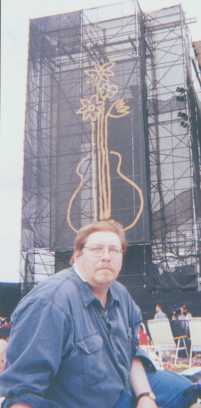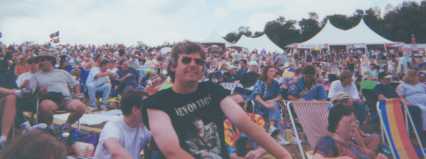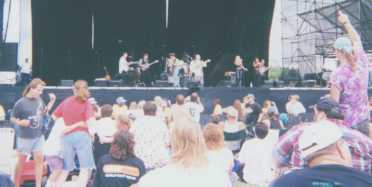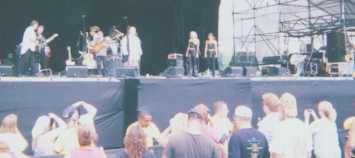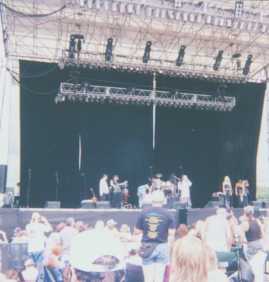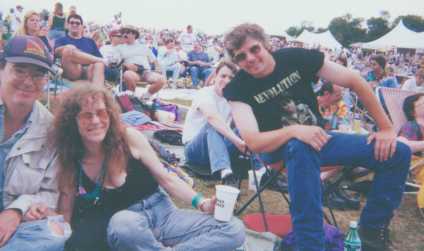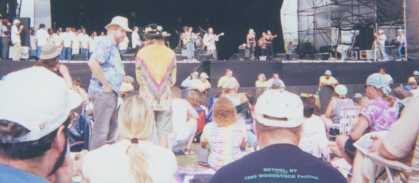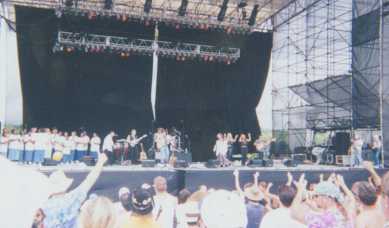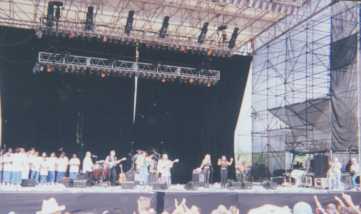|
Return to Woodstock by Fredrik King On the first weekend of August 1999, a music
festival called "Woodstock" was being held in the town of Rome, New
York. This was supposedly an anniversary of the original Woodstock of thirty
years ago, the fabled "Summer of Love." But by the end of this
particular festival, held on the black tarmac of an airfield, there were fires,
rioting, and sexual assaults on an undetermined number of women, gang attacks
that took place before the eyes of the audience. This was hardly the peace
and love that symbolized the original Woodstock. And in fact, this particular
event was Woodstock in name only.
Unnoticed, or ignored, by the media, another Woodstock would take
place a week later, at the site of the original festival, in Sullivan County,
NY, over 100 miles south of the disaster in Rome. The organizers of this
festival didn't have the legal right to the name "Woodstock," so it
was simply called "A Day in the Garden," after a song written to
celebrate the original festival of 1969. I was
too young to go to the original Woodstock, but on this 30th anniversary my
favorite singer, Melanie Safka, simply known as Melanie, was going to
perform, along with other singers who performed at Yasgur's Farm three
decades ago. This time, I would be there. After two days of driving my Chevy Blazer from metro Detroit through Canada and the Catskills region of Sullivan County, New York, I reached the village of Montecello on Saturday, August 14, about ten minutes away from Bethel and Yasgur's farm, the site of the original Woodstock. I rented a motel room, and made final preparations for the Sunday concert. I checked my small backpack for some items: a pair of Melanie CDs I hoped would get signed, a Sharpie felt tip pen, a notebook, and a disposable camera. (The Garden people said no cameras would be allowed, but I thought I might be able to smuggle in a small inconspicuous disposable 35mm.) I was thinking: I'm here, I've made it, I'm really going to see Melanie perform for the first time in my life after waiting for over twenty-five years . . . . I woke Sunday morning at 8:00. I looked out
the motel room window; the pavement around the motel was moist. It had
rained, although not much. Would there be the kind of rain that blanketed the
original Woodstock thirty years ago? I stepped outside the motel where others
were gathering; they were here for the festival as well. I wondered how early
I should leave, and decided the earlier the better. By about 10:00 I was back
in the Blazer, making my way down Route 17 B, to Bethel and Yasgur's
farm. I followed a line of cars into
a parking area where attendants directed the small stream of vehicles into
the lots, grassy sections that were designated for parking, not paved lots as
such. I was directed to the end of a row, right next to a wooden log fence. I
parked, grabbed my gear, and followed a group of people through a wooded,
pleasantly shaded path to the farm entrance. I was lucky; I was early, and I
was quite close to the entrance. By this time, the air started to heat up;
the sky was spotted with fluffy clouds, white and blue shadowed, not the gray
of threatening storms. The sun often punched through the clouds as we stood
waiting to be allowed to enter the farm, and it was clear there wasn't going
to be any rain for a while, but the sunlight was going to be another matter
entirely. About thirty minutes later we were allowed through the main
entrance to the farm, only to come to still another gateway. Here we waited
some more, while the sun continued to pound at us; then we were directed to
different parts of the final entrance. Those with tickets went right through
at one part of the entrance, while the others had to go on the other side to
buy tickets before being allowed entrance. Security checked us for coolers and cameras;
I heard some people say, "only 35mm cameras allowed." That meant, I
heard later, that while there was a prohibition on cameras, in reality the
only cameras that were not being allowed were those with telephoto lenses or
video cameras. A security guard pleasantly asked me if I had any coolers, and
shook the pack on my back. "No liquor, no coolers," I said. She let
me pass. Perhaps two dozen vendors had
tents set up, hawking their various wares, photos, T-shirts, beaded
necklaces, handcrafted items, many quite nice. But I wanted a good spot, so I
bypassed the vendors, went through a large tent where beer and bottled water
was being sold, and beyond I saw the stage. The earth slopped downward; in
this part of the country, the land rolled unpredictably. My home state,
Michigan, is basically a big pancake flattened by glaciation during the Ice
Age, so I felt constantly disoriented, off balance, as I walked on this
uneven ground. Fortunately, I was carrying my black walking stick, which I
usually carry because of a bad leg; now it was helping me to keep my balance
on this careening Noon. There were two opening acts
featuring young female vocalists; I didn't catch their names but they played
enthusiastically and were received warmly by the crowd. I was delighted that
everyone in the audience was polite and cordial; people were being good to
each other in the spirit of the original Woodstock. Not once today would I
see any violence or outrageous behavior. Water vendors were wandering through the crowd, selling bottles of water at two dollars each. (Not a particularly outrageous amount.) The dj also continued to advise the crowd about first aid tents and open showers in case people needed to get doused to cool off. Unlike the "Woodstock" that took place in Rome, NY the previous week, the operators of A Day in the Garden were taking real steps to ensure everyone's safety. Another wait, at least thirty minutes. Then
several musicians came out and took their places; two percussionists, one at
the main drum stand, another behind a pair of tall chest high drums, the type
drummed by hand. A bassist took up his bass guitar, as Melanie's son and
daughters, Beau, Leilah, and Jeordie walked on to the stage. Then at last,
Melanie. Leilah and Jeordie were at
microphones to Melanie's left, Beau at her right, taking Melanie began the opening chords for a very
familiar song; people were already cheering before she could start singing.
"This is the song that doomed me to eternal cuteness," she said,
and began singing her naughty and cute "Brand New Key." When she
reached the third verse she interrupted herself to say, "This is "Brand New Key" was followed by "Look What
They've Done to My Song Ma" and "To Be a Star." She talked a
little about her youth and how "Momma, Momma" reflected the
feelings of that youth, and was a song of sorts for Beau now. She commented,
jokingly, of all the "older people out here," noticing that so many
of us were baby boomers, her generation, and how Woodstock should be an event
for all ages, young and old both. "Beautiful People" came next,
then "Jammin' Alone" and by the time she began "Ruby
Tuesday," virtually everyone was on their feet, swaying and singing with
Melanie like a huge human wave. A new song followed, "Her Hymn,"
and then at last, "Lay Down." After "Lay Down," the song that
reminds me that we can be so much better than we frequently are, Melanie I grabbed my jacket and walking stick; the
"Ring the Living Bell" collection disks were in my jacket pocket
with the Sharpie marker. I went to the left of the stage, following the black
canopy curtain, pass a first aid tent and an open shower where some children
were playing under the water spray. Another sloping tract of land; at the end
of the canopy was a dirt road, separated from the grass with another wooden
log fence, the fence I think surrounded the entire farm. The canopy ended at
the road, and between the canopy corner and the fence was an eight-foot gap,
where I saw Richie Havens--another original Woodstock performer--amiably
chatting with a group of fans and well wishers, maybe twenty to thirty total.
I tried to move towards the gap in the fence, hoping for a glimpse of
Melanie. At one point, as Jeordie was crossing the road again back to the tented off-limits area, she heard the people call out to her and wandered over to us. Somehow I found myself within inches of Jeordie, and I was being jostled by flailing hands and a couple of bodies desperately trying to talk with Jeordie or get her signature. I thought for a moment to take her picture, being so close to her, but she had just finished a strenuous performance with her mom, it was oppressively hot, fans were screaming, and I didn't want to make things worse by putting a camera in front of her face. But I did try to examine her face closely; Melanie's features are all over her. She is every bit her mother's daughter, even in her manner and demeanor. I took out my Living Bell CD and my marker
pen. People were asking for Jeordie's signature, but she didn't have anything
to sign Another wait; by this time, I think it was
about 4:30. Suddenly a van appeared and inside we could see Melanie, waving
back to us. I will admit, I was a little saddened that I couldn't meet her,
but it had been a long day for me and I'm sure it was much worse for Melanie.
She put on a long and energetic show in the middle of a brutal heat wave, and
to see Melanie perform was the reason I and many others were there, after
all. And, I thought, I got to meet Melanie's daughter, and in her face I
could see Melanie. I went back to my original spot before the
stage while Leslie West was pounding out "Mississippi Queen,"
gathered my blanket and things, said goodbye to the folks around me, and
headed back to my truck. I followed the fence back to the main entrance and
made my way back to the Blazer. Fortunately, since it was already parked by
the edge of the parking area, it was easy to find. I drove back to
Montecello, stopped at an unpretentious diner There are certain times in our lives, certain events, both happy and sad, that we take with us and store in the memory palaces of our minds. Graduation from high school, the first day of college, a first love, marriage, the birth of a son or daughter. For me, the experience of being at Yasgur's farm in 1999 will have a special place in my own memory palace, something that will remain fresh and vital in my memory long after the event itself has ended. Like that anonymous person called out to Melanie at the festival, Woodstock is in our hearts. It remains in mine. |
Back
to Chronology
Back to Melanie
Fredrik
King is a writer and artist who lives in Michigan, US. He holds both B.A. and MA
degrees in English from Oakland University and has taught English at local
colleges and schools. His articles and illustrations have appeared in numerous
publications. He is to be listed in the 1999 edition of The Year's Best in
Fantasy and Horror as recommended artist.
His art has
been displayed at the Maniscalco Gallery in Grosse Pointe, MI. Pen and ink
gothic art can be seen at www.geocities.com/SoHo/Exhibit/5951.
His email is warlock@advdata.net.
